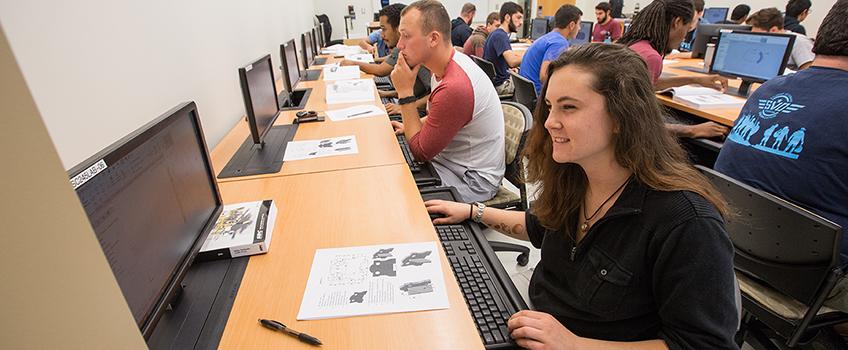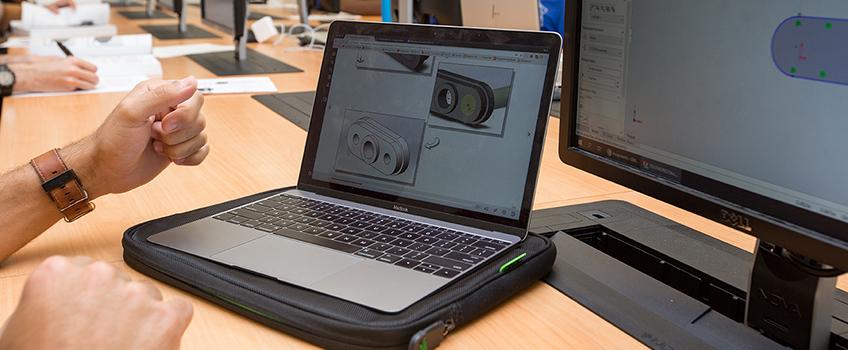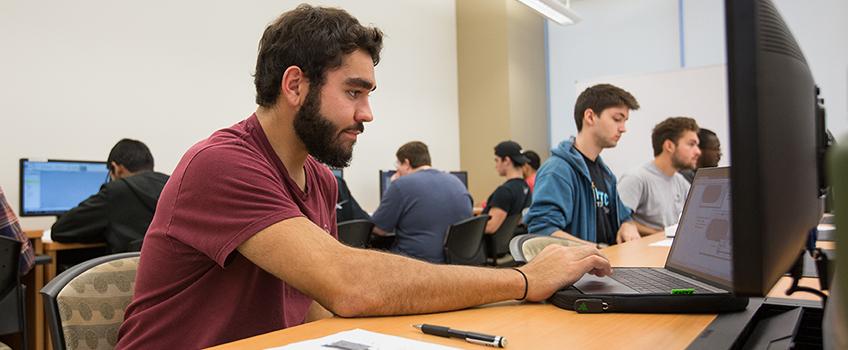Dual-Degree Engineering



The Engineering (ENGN) dual-degree program is established jointly with New Jersey Institute of Technology (NJIT), Rowan University, and Rutgers, the State University of New Jersey. It is a five-year program designed for motivated students who are well prepared in mathematics and science and interested in a challenging college curriculum.
Because of the increased competition in the job marketplace, many of today’s college students are choosing to broaden their educational foundations by pursuing multifaceted career objectives such as minors along with majors, double majors or dual undergraduate degrees. This program provides you with two very marketable college degrees.
About the Program
Program Coordinator:

Monir H. Sharobeam
The program begins with three years at Stockton and concludes with two years at NJIT, Rowan, or Rutgers. It combines a strong foundation in science, mathematics, and basic engineering and breadth in liberal studies in the first three years at Stockton, with well-developed, in-depth technical courses in the last two years at NJIT, Rowan University, or Rutgers. Student receives a BS degree in chemistry, mathematics or physics from Stockton at the end of the fourth year and a BS degree in engineering from Rutgers, Rowan, or NJIT at the end of the program.
This unique opportunity in engineering education offers the best of both worlds. Stockton is a strong liberal arts school whose main emphasis is on excellence in teaching and where all classes – including entry-level – are small and taught by faculty members, not graduate students. Stockton prepares you with solid training in mathematics, science, and basic engineering. Stockton also provides you with a strong liberal studies component
to broaden your intellectual scope, enhance your communication skills, and help you acquire leadership qualities. Add to this the in-depth technical courses available at highly ranked engineering schools such as NJIT, Rowan, or Rutgers, and the result is a unique undergraduate curriculum that develops highly qualified engineering professionals who are well equipped to meet the demands of a changing technological world.
Curriculum
To see the curriculum for your area of interest, you’ll use the web program, Degree Works. This program is accessible even if you are not currently a student with Stockton University. If you are a current student at Stockton University, access your portal for Degree Works, then look for the “what if” option to explore the various paths towards degree completion.
The Dual-degree Engineering program has multiple concentrations of study, and every student is required to select a concentration.
Degree Offerings
Dual Degree - Bachelor of Science in Chemistry from Stockton, and Bachelor of Science in Engineering from Rowan or Rutgers
Dual Degree - Bachelor of Science in Mathematics from Stockton, and Bachelor of Science in Engineering from Rutgers, Rowan, or NJIT
Dual Degree - Bachelor of Science in Physics from Stockton, and Bachelor of Science in Engineering from Rowan, Rutgers, or NJIT
Degree Works Curriculum & Transfer Equivalency Tool
You can see the curriculum for your area of interest using Degree Works. This service is accessible even if you are not currently a student with Stockton University.
Instructions on How to Use Curriculum ToolB.S. degree in Physics from Stockton, and a B.S. degree in one of the following engineering fields, depending on the student's choice of the engineering school:
Rutgers
B.S. in Bioenvironmental Engineering, Biomedical Engineering*, Civil Engineering, Electrical and Computer Engineering, or Mechanical and Aerospace Engineering
Rowan
B.S. in Biomedical Engineering, Civil Engineering, Electrical and Computer Engineering, or Mechanical Engineering.
NJIT
B.S. in Mechanical Engineering
* Program may take more than five years
** Program may require taking courses in the summer of the third year
B.S. degree in Mathematics from Stockton, and a B.S. degree in one of the following engineering fields, depending on the student's choice of engineering school:
Rutgers
B.S. in Bioenvironmental Engineering, Biomedical Engineering*, Civil Engineering, Electrical and Computer Engineering, or Mechanical and Aerospace Engineering
Rowan
B.S. in Biomedical Engineering, Civil Engineering, Electrical and Computer Engineering or Mechanical Engineering
NJIT
B.S. in Mechanical Engineering
* Program may take more than five years
** Program may require taking courses in the summer of the third year
B.S. degree in Chemistry from Stockton, and a B.S. degree in Chemical Engineering, depending on the student's choice of engineering school:
Rutgers
B.S. degree in Chemical Engineering**
Rowan
B.S. degree with Chemical Engineering**
* Program may take more than five years
** Program may require taking courses in the summer of the third year
Engineers are in very high demand in today’s high-tech world. The Bureau of Labor Statistics forecasts an average growth rate in employment between 2014 and 2024 of 23% for biomedical engineers, -2% to 3% for chemical, computer, electrical, and electronic engineers, 5% for mechanical engineers, 8% for civil engineers, and 12% for environmental engineering. Opportunities for engineers are available in industries, government, and academia.
Mechanical engineers are hired by industries concerned with the design and development of power plants, mechanical systems, vehicles, engines, machine parts, and conventional and alternate energy systems. Positions for electrical and electronics engineers are available in different areas such as the design and development of electrical devices, computers, communications, and control systems.
Civil engineers are usually employed in areas such as design, planning, and construction of new cities, highways, dams, and water and sewage systems. Positions for chemical engineers are available in pharmaceutical, food, pesticide, fertilizer, and petroleum industries, and in pollution control and treatment.
Biomedical engineers are hired by industries involved in the design and manufacturing of devices and equipment used in healthcare. There are also job opportunities for biomedical engineers in institutions involved in research on new medical technologies such as drug delivery systems, tissue engineering, and artificial limbs and organs.
Sample list of potential careers:
The Student Career Center is available to guide you through your career development
journey - from CV writing, interview prep or general guidance.
During freshman orientation, inform your advisor of your interest. You will also need to fill out a special form early in your first semester at Stockton to declare the track. The form is available at Academic Advising.
Students in the program complete the mathematics, physics, chemistry, and general education course requirements for the engineering degree in addition to some basic engineering courses at Stockton in the first three years. These courses will be counted toward their Stockton degree as well as the engineering degree. At the end of the third year, qualified students in the program are automatically transferred to Rutgers, Rowan, or NJIT to complete the engineering curriculum. At the end of the fourth year, students in the program are qualified for the Bachelor of Science degree from Stockton. The Bachelor's (or Master's) in engineering is awarded at the end of the program.
No, this dual-degree engineering program is offered only through Rutgers, Rowan, and NJIT. It is established through articulation agreements that are signed by the involved schools. These schools are obliged to honor the terms and conditions of these agreements.
Courses in which a grade of C or better has been earned and are contained in the dual-degree curriculum will be accepted by each engineering school for its respective degree.
No, you do not need to decide on your prospective engineering school now. You will have till the time of your transfer to the engineering school to decide which one you would like to go to. However, selecting an engineering school early may give you more flexibility in your choice of general education courses. Also, keep in mind that not all engineering fields are provided by every one of the engineering schools participating in this program.
Qualified students in the program at Stockton will be automatically transferred after the third year of their study at Stockton to NJIT, Rowan, or Rutgers. No new SAT or ACT scores and no entrance examinations are required. Early in the spring of the third year, qualified students in the program need to meet with the engineering coordinator to initiate the automatic transfer process as stated by the articulation agreements between Stockton and the participating engineering schools.


